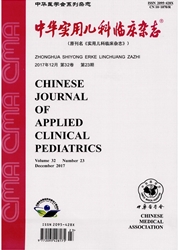
欢迎您!东篱公司
退出

 中文摘要:
中文摘要:
幽门螺杆菌(Hp)是一级致癌因子,感染范围广、持续时间长,根治性差,临床获得的Hp毒力变异明显,感染后因患者炎性因子表达不一致,造成感染后临床表现和转归不同。因此对于细菌基因多态性和人炎性因子多态性之间的相互作用已成为今后治疗Hp感染的研究方向。
 英文摘要:
英文摘要:
Helicobacter pylori(Hp) is considered as the type I carcinogen. The bacteria infection expands all over the world and lasts for a long time which means the treatment can not cure it completely. Because of the polymorphisms of the bacteria gene,clinical Hp has various significantly different toxic factors, which can cause the different outcomes, for the polymorphisms of infected persons' inflammation factor genes. The interaction between the bacterial gene polymorphism and human inflammatory factors has become the future direction of treatment of Hp infection.
 同期刊论文项目
同期刊论文项目
 同项目期刊论文
同项目期刊论文
 期刊信息
期刊信息
